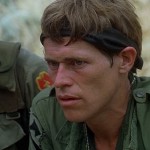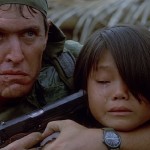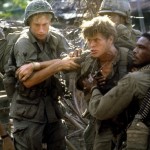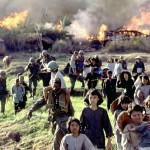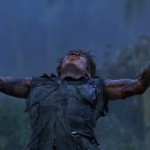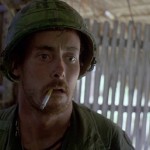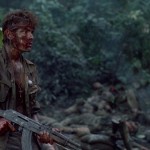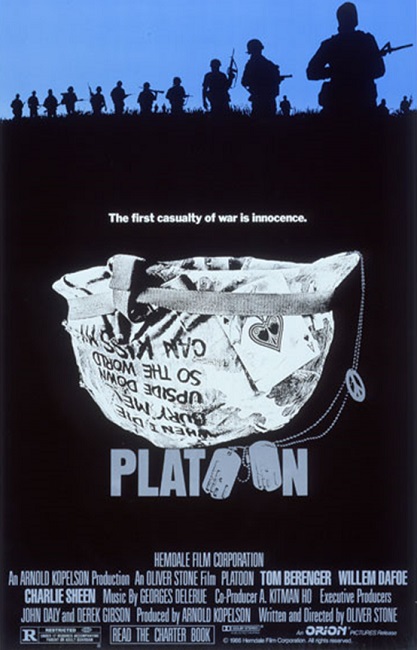
Platoon – 1986
Here we have another war film. This is the first one that really dealt with the Vietnam War in a hard-hitting way. Sure, The Deer Hunter took place in the Vietnam War and had a few scenes that took place in Vietnam, but it was more like fantasy than reality. Platoon really took the war head-on.
The Vietnam War was unlike any other war in history in so many ways. It took place in a time of great political, social and cultural upheaval leaving very few people in the United States unaffected. The fighting conditions were unlike anything our soldiers had ever faced. Warfare technology had progressed to a point where injuries and death were dealt more horrifically than ever before.
Platoon caught me off guard. I went into it having never seen it before. After all, I am not a huge fan of war films, especially not if they get too graphic or bloody. Platoon was very violent and bloody, stressful to watch and heartbreaking at times. But it was a film that also had a very deep emotional content and characters that were powerful. It starred Charlie Sheen as the lead, Private Chris Taylor, an enlisted college drop-out assigned to Bravo Company, 25th Infantry Division. The story was told from his perspective. In fact, a certain amount of narration takes place in the form of Taylor’s letters to his grandmother.
Oliver Stone directed this movie, and I have to make special mention of that because the advertisements and trailer really emphasized the fact that Stone had served in the Vietnam War with the 25th Infantry Division. He was wounded twice and received the Purple Heart with an Oak Leaf Cluster. That really went a long way to validating the credibility of the film, and its excessive violence. In fact some have called Platoon a semi-autobiographical film for Stone.
Either way, I felt he achieved a realism that is rarely seen in movies. The dirt, the grime, the horrible jungle environment, the wounded men, the insanity, the loss of one’s sense and reason, and the ever present fear of pain and death were all blatantly displayed in harsh tones of green, black, brown and red.
Interesting note: In order to get the most realism he could out of his actors, Stone forced them to go through similar conditions to real soldiers. He made them carry heavy packs and provisions, dig foxholes, go on forced marches, and deprived them of sleep for two weeks before filming started. This had the effect of making sure the actors looked as beat and weary as their characters were supposed to be.
Sheen did a great job. These days, Sheen has been in the media and has become known as a crazy guy, a wild partier, and even pretty loony at times. It is easy to forget that he can actually be an excellent actor when he wants to be. His portrayal of Chris Taylor proves that point. He was young and he had a look of naiveté about him that was essential for the character. At least, that is how he started out. By the end of the film, he was on the verge of madness and possibly even suicide, though we’ll get to that in a bit.
There was actually a fairly extensive list of actors that have gone on to prolific careers that were in Platoon: Tom Berenger, Willem Dafoe, Johnny Depp, Forest Whitaker, Kevin Dillon, and John C. McGinley. And those are just the ones I personally recognize. The entire cast did a great job, but apart from Charlie Sheen, two of these actors had prominent parts. Berenger played the part of Sergeant Bob Barnes. He was the stereotypical macho asshole guy who thought he was tougher and smarter than anyone else. He thought he was above the rules when in reality his humanity had sunk lower than anyone else’s. Unfortunately, he was also the Platoon Leader.
Opposite him was Dafoe, playing the part of Sergeant Elias. Elias turned out to be a good guy. He became sort of a mentor to Taylor who was having a tough time assimilating the life of an infantry man. Elias helped him out, stood up for him and became a kind of friend. I have often been prejudice against Willem Dafoe, though I must admit, I always have difficulty explaining why. Something about him as an actor just seems creepy to me. But I also cannot deny that he is skilled at his craft. More than once I have seen him turn in good performances in various films. This was no exception. He was a likable character and Dafoe did a good job.
But everything changes when the platoon is ordered to investigate a village of Vietnamese peasants suspected of harboring NVA (North Vietnamese Army) soldiers. The men of the platoon go crazy. Before this they had spent months in the jungles fighting the NVA, watching their companions die horrible deaths, and knowing that at any second, any one of them might be next. Then they find one of their patrols mutilated and tied to a post. The sanity of the platoon snapped as the villagers cowered in fear. Even Taylor loses himself and starts shooting at the feet of a man and woman, making them “dance.” This only stops when another member of the platoon steps in and bludgeons the man to death with his weapon. After that Taylor finds several men trying to rape two young girls of the village and stops them.
While interrogating the village chief, Barnes, believing that he is hiding more NVA soldiers despite his protestations, loses control and shoots the chief’s wife in the head, murdering her. But if that wasn’t enough, he grabs the chief’s daughter and threatens to execute her if the NVA soldiers are not given up. Elias intervenes and gets into a fist-fight with Barnes.
Elias brings formal charges against Barnes, but before the case can be tried, the platoon is ordered back out into the jungle. In order to stop the inquiry and subsequent court-marshal, Barnes murders Elias. Taylor doesn’t see it happen, but he strongly suspects the truth. Barnes tells him that Elias is dead and the two head back to the helicopters. But as the helicopters are flying away, Elias runs out of the jungle being chased by a host of enemy soldiers. This is where the famous shot of the dying man with his arms raised to the sky which is featured on some of the promotional posters for the film came from. I thought it was an unusually over-dramatized death for a film which has gone out of its way to be realistic and somewhat matter-of-fact about death.
Now, I know I am simply spelling out the main plot, which I usually try not to do too much during my reviews, but I have a reason. You see, the climax of the film depends on this and I want to comment on how the movie ends. After a huge battle where the U.S. troops are defending against a major assault, Taylor and Barnes are fighting for their lives. At one point, knowing that Taylor could still blow the whistle on him, and even accuse him of murdering Elias, Barnes tries to murder Taylor as well. But they are both knocked unconscious before that can happen.
When Taylor wakes up the next morning, he finds an enemy rifle and points it at Barnes who is lying on the ground. In his macho style, Barnes croaks something like, “Just do it!” not believing that Taylor has the morals of a murderer. But my jaw just dropped when, without the slightest hesitation, he actually does it! He shoots Barnes in the chest, killing him instantly. I was shocked! Most Hollywood movies take the high road, making the main character out to be noble and forthright. The fact that Taylor actually committed murder, even though it was the murder of a man who deserved it, was a wonderful departure from the typical movie hero stereotype!
The tagline for the film in advertisements was a play on a famous phrase. “The first casualty of war is innocence,” the original word, of course, being “the truth.” This profound ending really drove that point home in a powerful way. Taylor sheds the last of his innocence when he murders Sergeant Barnes in a very cold and casual way. Of course, he is sent home after that, having been wounded twice during his time in service.
Interesting note: The plot synopsis on Wikipedia says that after killing Barnes, Taylor actually contemplates suicide before he is found by U.S. troops. This was not very evident in the film, though it makes perfect sense.
Another interesting note: Oliver stone made a cameo appearance as the battalion commander of the 3/22 infantry in the climactic battle which was based on the historical New Year’s Day Battle of 1968. Stone actually took part in that battle while in Vietnam.
Of all the other actors in the film, I really liked the character of Sergeant O’Neill, played my John C. McGinley. He did a great job playing a character that, while not exactly likable, was very believable. He desperately wanted to go home. At the very least I think that would have been my attitude, had I been there and so I felt a tremendous amount of sympathy for his character. In the end, he only survived the final battle by hiding under the body of a dead soldier. In that way he escaped injury, but in doing so he got promoted to Platoon leader, thus keeping him in Vietnam while others were allowed to go home. The look of horror and resignation on the man’s face when he received his promotion and realized that he couldn’t leave was almost enough to make me teary as well. Very well-acted McGinley!
This was not exactly an easy movie to watch but it was very well done and I ended up liking it despite myself. I appreciated the realism of the plot and the depiction of the horrors of the Vietnam War. It was thought provoking and it stuck with me for several days after watching it. The movie was nominated for 7 Academy Awards, winning 4 of them. In addition to Best Picture, it won for Best Sound and Best Film Editing, and Oliver Stone took home the Oscar for Best Director. This was truly a powerful piece of film-making.

